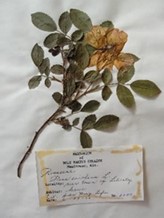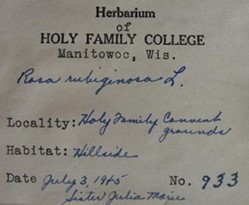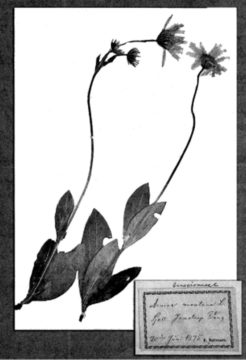Franciscan Sisters of Christian Charity share an article that appeared in the Woodland Dunes Nature Center and Preserve Dunesletter, Spring 2022, regarding the Holy Family College Herbarium Collection.
 One year ago, Woodland Dunes received an exciting inquiry asking if we would like to take the herbarium collection that was housed at Silver Lake College (Holy Family College) due to its closing. Upon hearing that much of it was collected in Manitowoc County, we were more than happy to drive to the campus and were shown to a room labeled, “Sister Teresita Kittell’s Herbarlurn. There sat 25 boxes filled to the brim with plant specimens that we immediately packed into Jim’s car and headed back to the nature center where I began to catalog the boxes’ contents.
One year ago, Woodland Dunes received an exciting inquiry asking if we would like to take the herbarium collection that was housed at Silver Lake College (Holy Family College) due to its closing. Upon hearing that much of it was collected in Manitowoc County, we were more than happy to drive to the campus and were shown to a room labeled, “Sister Teresita Kittell’s Herbarlurn. There sat 25 boxes filled to the brim with plant specimens that we immediately packed into Jim’s car and headed back to the nature center where I began to catalog the boxes’ contents.
We knew that a majority was collected in the mid-1900s by the Sisters. What we did not expect though, was that the rest of the collection were plant specimens from around the world dating back to the mid-1800s. The oldest specimen so far has been from 1862. How amazing is that?
In addition to the plants being older than we thought and from all around the world, some of the collectors were famous botanists. To name a few:
Rebecca Merritt Austin (1832-1919). One of the first female naturalists and one of the first people to study carnivorous plants, such as the pitcher plant. She also corresponded with Asa Gray and Charles Darwin.
Alice Eastwood (1859-1953). A botanist accredited with building the botanical collection at the California Academy of Sciences in San Francisco. She also published over 310 scientific articles and authored 395 plant species names (the fourth-highest number of names authored by a female scientist).
 Percy Gentle (1890-1958). The Queen’s Botanical Garden describes Percy as being one of the first African-American plant collectors/botanists of the Americas. He was one of the first native Belizean natural scientists and collected nearly 10,000 plants which were critical in understanding the flora of Belize.
Percy Gentle (1890-1958). The Queen’s Botanical Garden describes Percy as being one of the first African-American plant collectors/botanists of the Americas. He was one of the first native Belizean natural scientists and collected nearly 10,000 plants which were critical in understanding the flora of Belize.
- F. Blake (Sidney Fay Blake) (1892-1959). Recognized as one of the world’s experts on botanical nomenclature. He was also named one of the 50 greatest living botanists in America by the Botanical Society of America in 1956.
Like other herbariums, this collection is incredibly important.  These specimens are historical records that cannot be replaced, which is why cataloging these specimens is so important. There is currently no digital or written record of the specimens within this collection and due to their age, handling them often would degrade the quality. By entering them into a database, anyone from around the world can look at them. Herbarium collections can tell us what plants were growing in specific areas during specific times, which is what Woodland Dunes is very excited to explore. This information can show us what plants used to be here and compare that to what plants are here now to help with restoration efforts on the preserve.
These specimens are historical records that cannot be replaced, which is why cataloging these specimens is so important. There is currently no digital or written record of the specimens within this collection and due to their age, handling them often would degrade the quality. By entering them into a database, anyone from around the world can look at them. Herbarium collections can tell us what plants were growing in specific areas during specific times, which is what Woodland Dunes is very excited to explore. This information can show us what plants used to be here and compare that to what plants are here now to help with restoration efforts on the preserve.
I am overjoyed to know that the work that we are doing ensures that the work that Sister Teresita and the other Sisters did in collecting and preserving this collection does not go unnoticed. In addition, we hope these specimens can be viewed for future research and education.
We have had very little funds to work on this project; however, we are currently looking for grants, donations, and additional funding sources for covering the costs of cataloging and maintaining the collection for years to come. There are many more boxes to go through, but I am excited to see what other surprises are waiting for us to discover.



Article Comments:
Fr. Placid Stroik, OFM 05/31/2022 @ 11:42 pm
The whole world is in our hands and this collection was inches from mine. Glad the collection is now in good hands forever, forever. thanks.